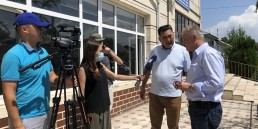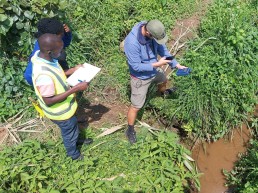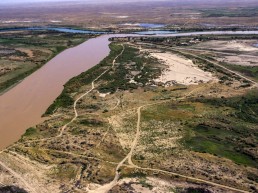June 28, 2021
Project Start: Rehabilitation of the Water Supply and Wastewater Systems in the Villages of Myrza-Ake, Don-Bulak, Kurshab and the Cities of Kerben and Isfana in Kyrgyzstan
Assignment location: Kyrgyzstan; Osh, Jalal-Abad and Batken regions
Clients: Water Supply and Wastewater Management Agency of the Uzgen Region, Municipal Enterprise Kerben Suukanal and Municipal Enterprise Isfana Taza Suu
Origin of funding: European Bank for Reconstruction and Development (EBRD)
In 2019, EBRD concluded loans with the Kyrgyz Government benefitting the large villages Myrza-Ake, Kurshab and Don-Bulak, and the cities of Isfana and Kerben to rehabilitate and expand the water supply and wastewater infrastructure. HYDROPHIL has been hired to prepare the technical designs, assist with tendering and select the construction companies. HYDROPHIL will also supervise the construction works and implement the Environmental and Social Action Plan.
The investment will primarily focus on replacing critical water supply networks, modernising household metering, and operational and maintenance equipment. The investments will significantly improve access to clean water, reduce water losses, enhance resilience to climate change and optimise the companies’ operating costs.

Picture Source: O. Gurli & M. Edthofer
Our teams of engineers kicked off all three projects with visits to all five locations from 31 May to 11 June 2021. They spent three days at each project site and discussed the planning challenges with all decision-makers. In the large villages of Myrza-Ake, Kurshab and Don-Bulak, our engineers supported the water company at public hearings, where all measures were explained to the population and questions were answered.
Mr Edthofer, the HYDROPHIL project manager for all three contracts, summarises the situation: “The challenge in all three locations is to translate the contents of feasibility studies, which were prepared several years ago, into concrete planning requirements. Many things have changed in the meantime, which now must be considered without losing too much time. ”
Mr Stoisits is leading the expert teams for all three projects, building on his years of experience with similar water projects in southern Kyrgyzstan. He says, “it is now important that we closely work with my Kyrgyz colleagues and the Vodokanal staff to quickly identify – within a few weeks – the critical infrastructures to enhance the supply water coverage. We will specify streets where desolate pipelines need to be replaced and new supply networks to be extended. We shall not lose any time since the construction should start approximately in a year.”
Our team of Kyrgyz and Austrian engineers, social and environmental experts travelled to all project sites by car, covering about 2,500 km. “The car journey was exhausting at times, but also wonderful when I, as a planning engineer, have the opportunity to get to know the country, its local population and its decision-makers personally. It motivates me when I know for whom exactly the technical calculations and planning are done. We do this to make a direct contribution to a better life for them,” Ms Gurli said.



